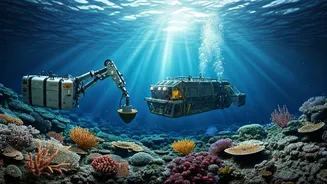Mining and Ecosystems
Deep-sea mining operations, although relatively new, are raising serious concerns about their ecological consequences. The extraction of minerals from
the deep seabed carries the risk of significantly disrupting the delicate balance of the marine food web. This ecosystem, characterized by specialized species adapted to extreme pressures and darkness, could face widespread devastation from mining activities. Disturbing the seafloor through sediment plumes and habitat destruction could eliminate numerous species, and the effects will likely cascade upwards through the food chain. Moreover, the disruption of habitats in the deep sea could reduce biodiversity and the complex relationships that support marine life. The environmental impacts of mining could affect a large scale, even potentially disrupting the carbon cycle and ocean's role in regulating climate. Overall, there's a need for thorough environmental impact assessments and strict regulations to mitigate the harm caused by deep-sea mining to protect marine ecosystems.
Water Quality Impacts
Deep-sea mining activities bring a variety of changes to the water quality in the area. The processes involved in extracting minerals often create sediment plumes, which can spread over large areas, smothering marine life, and reducing visibility for species. Mining can also cause chemical pollution through the release of heavy metals and other toxic substances into the water. These pollutants can harm marine organisms directly or indirectly by contaminating their food sources. The alteration of water temperature and salinity due to mining can also affect the distribution and behavior of marine species. In addition to direct impacts, the disturbance of the seafloor can also release nutrients, which can lead to algal blooms and other imbalances. Considering the fragile nature of deep-sea environments and the potential for long-term impacts, careful consideration of water quality implications is essential when evaluating the viability and sustainability of deep-sea mining operations. Thorough monitoring and proactive management of potential impacts can reduce the risks, helping protect the deep-sea ecosystem.
Resource Alternatives
The growing demand for minerals, often extracted through deep-sea mining, calls for an exploration of alternative resources. One approach involves recycling, where electronic waste and other discarded materials can be processed to recover valuable minerals. This method reduces the need for new mining activities, decreasing environmental damage. Another approach includes looking into the use of terrestrial mines. Some terrestrial mining operations are better regulated and may be less destructive than deep-sea extraction. Furthermore, advancements in material science and engineering have led to the creation of materials that can substitute minerals, decreasing the reliance on mined resources altogether. These materials may have similar properties and functions without the same environmental impact. Developing more resource-efficient practices and promoting the circular economy can decrease the demand for newly extracted minerals. Prioritizing research and development on these alternative sources is crucial. It can decrease the harmful effects of deep-sea mining and help secure a more sustainable future for the planet.
Mining’s Current Status
The current status of deep-sea mining reflects a complex picture of technological advancements, economic interests, and environmental concerns. Although the industry is still in its infancy, several companies are actively exploring and testing deep-sea mining technology in various locations around the world. These operations primarily focus on extracting minerals like polymetallic nodules, massive sulfides, and cobalt-rich crusts, which are valuable components in electronics and other products. However, these explorations face significant environmental hurdles, which result in scrutiny from environmental organizations and governments. Environmental regulations and assessments are ongoing, with the International Seabed Authority playing a crucial role in setting standards and guidelines for deep-sea mining. The development of this industry is also influenced by economic factors, including the prices of minerals, the technological costs, and market demand. While deep-sea mining holds potential economic benefits, the industry's success and sustainability will depend heavily on robust environmental safeguards. This calls for responsible governance, research, and transparent practices to reduce risks and ensure the long-term health of marine ecosystems.














![[WATCH] T20 World Cup 2026: Gautam Gambhir hosts dinner for Team India players ahead of Namibia clash](https://g-mob.glance-cdn.com/public/fc/image/7gXS1xdhs5Q0.webp)

